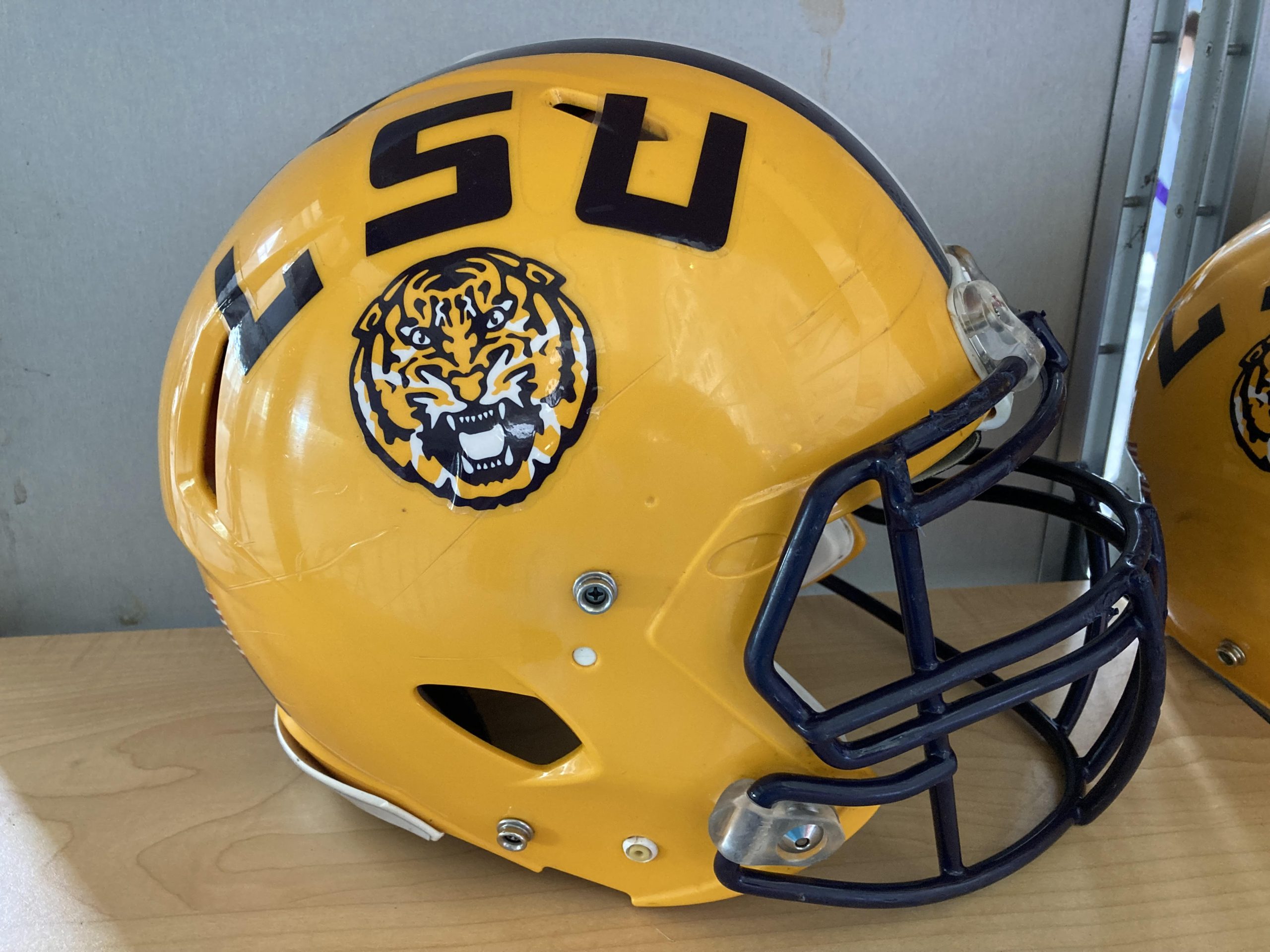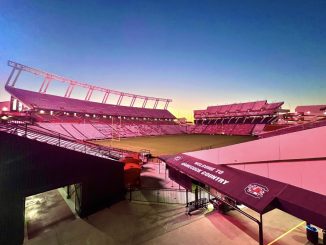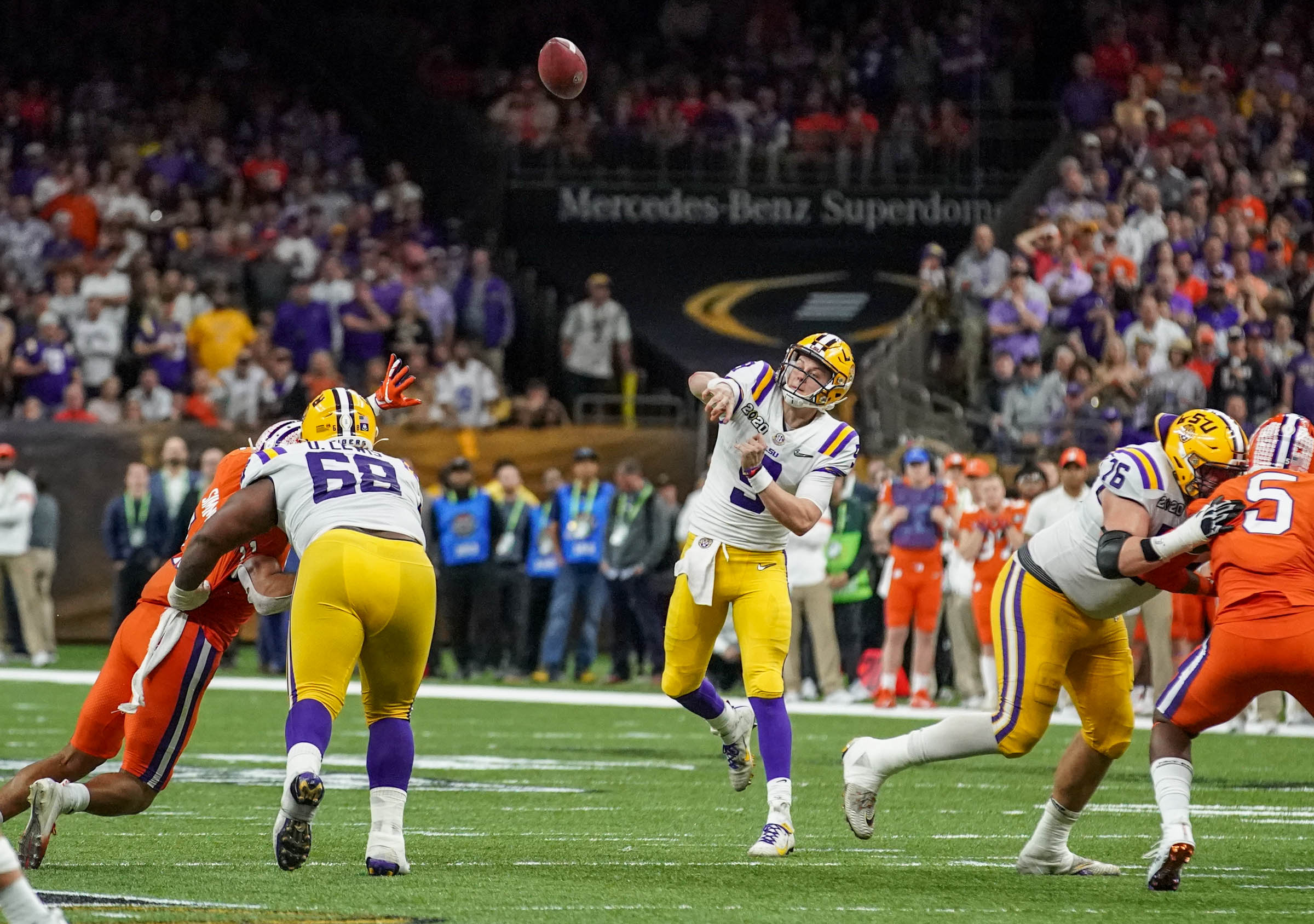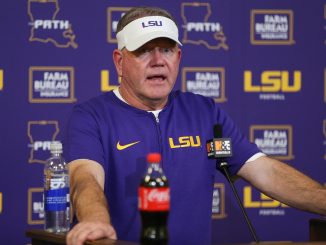
Bolstered by newfound authority vested by the state of Louisiana, LSU athletics officials are preparing to up their NIL game.
Hamstrung by limitations placed upon them by governing entities, the Tigers found themselves a leg behind in the name, image and likeness movement afoot now that the NCAA – once an opponent of the practice – permits student-athletes to be paid for promoting a product or service.
During its regular June 16-17 meetings the LSU Board of Supervisors approved a request to amend regulations related to NIL sponsorship policy, based on the fact Louisiana Gov. John Bel Edwards signed into law that same week a Louisiana Senate-approved bill permitting coaches and personnel at schools throughout the state to facilitate deals for its students-athletes.
That will help permit LSU to be more competitive in the NIL arena – which has become critical to recruiting big-time recruits, especially in football, basketball, baseball and high-profile non-revenue sports – with other SEC schools located in states already permitting such a practice.
“The change in the state law empowered us to level the playing field with the states that weren’t subject to the same limitations that we were,” said Cody Worsham, LSU’s Chief Brand Officer.
“The change in the state law allows us to facilitate deals. Previously we were strictly in an educational role; we could really just educate our student-athletes on best practices and, obviously, help them build their brands, elevate their brands.”
That simply wasn’t enough for a traditional college athletics power like LSU – which recently lost battles for three highly regarded in-state football recruits when Westgate High safety Derek Williams and Newman High quarterback Arch Manning both committed to Texas and Zachary High quarterback Eli Holstein committed to Alabama – to compete in the brave, new NIL world with powerhouse SEC opponents located in other states.
All three Class of 2023 recruits committed during a one-month period from late May through late June, prompting some LSU faithful to believe the program must do more.
Former LSU basketball player Collis Temple, now a member of the LSU Board of Supervisors, understands the need.
He also realizes what it will take even beyond the change in state law for LSU to be competitive.
“Louisiana State University is the flagship of Louisiana – athletically, and otherwise,” said Temple, who chairs the board’s Athletics Committee. “We’re in an arms race in the Southeastern Conference, if you will. We’re in an arms race. And unfortunately, unfortunately, the advantage in the arms race goes to the entity that has the most financial resources.
“So, if you look at the posture of Arkansas, and what resources entities like Walmart will bring to the table there, if you look at the length of time that the energy and oil and gas resources have made in the life of Texas A&M and the University of Texas, which I guess is soon to be a part of the SEC, those kinds of things have to be looked at.”
NIL IMPACTING NCAA CONFERENCE REALIGNMENT
Texas will soon be moving from the Big 12 to the SEC along with Oklahoma, for much of the same reasons USC and UCLA will soon leave the Pac-12.
It’s all about being able to make more cold cash, both for the schools and now, thanks to NIL, student-athletes too.
“So it’s just gonna come down to the folk with the most money that end up controlling that deal and driving the NIL,” Temple said. “It’s unfortunate, but that’s where we are, I think.”
Jay Blossman, another member of the Board of Supervisors, is confident LSU can be competitive with the best of the best in the NIL – for a different reason.
“LSU is its own brand. The big schools are gonna be fine with NIL,” he said. “I think it hurts collegiate athletics a bunch, just because the smaller schools will have a harder time attracting the better players.
“That being said, all schools will have NIL money at all levels – and they’ll participate to help the student-athlete. And that’s a good thing. But we’re in a new day with collegiate athletics, and I don’t want to say it’s ‘crazy,’ but it’s different. And I think over time the rules will kind of be reined in and be better.”
As for keeping up in the “arms race” Temple references, Blossman – who also sits on the Athletics Committee – has no worries whatsoever.
“We’ll be fine on that,” he said. “We have plenty, plenty of alumni and friends of LSU that want to help in any way they can.”
LSU is not alone in its quest to be more NIL-competitive.
On Thursday, UCLA cited NIL issues as one of the reasons it plans to leave the Pac-12 for the Big Ten starting with the 2024-15 school year. USC also is planning to leave the Pac-12 for the Big Ten.
“As the oldest NCAA Division I athletic conference in the United States and with a footprint that will now extend from the Pacific to the Atlantic,” UCLA officials said in a letter to Bruins fans explaining the move, “Big Ten membership offers the Bruins exciting new competitive opportunities and a broader national media platform for our student-athletes to compete and showcase their talents.
“Specifically, this move will enhance Name, Image and Likeness opportunities through greater exposure for our student-athletes and offer new partnerships with entities across the country.”
First-year Florida coach Billy Napier, the former Louisiana Ragin’ Cajuns coach, penned an open letter to Gator fans in late June.
“As we enter a new era of college football with Name, Image and Likeness,” Napier’s letter said in part, “we are fortunate to be at a place that is not only rich in history and tradition on the football field, but is also a top 5 public institution with more than 470,000 living alumni and incredible resources. We believe that NIL will be a strength at the University of Florida.
“We also believe in the professional development of our athletes. For that reason, we established the GatorMade program, a holistic player-focused and purpose-driven initiative that seeks to develop Gators beyond the football field by providing them with the necessary skills to succeed in life.
“GatorMade provides opportunities in financial literacy, micro-internships, networking, mentorship, agent education, NIL, business weekend trips and even service abroad,” Napier added. “We want to have a place where we work toward having a life-changing impact as a person, as a student and as a player. And GatorMade provides the building blocks.”
HOW THE TIGERS CAN UP THEIR GAME
LSU is expected to unveil a major new NIL initiative sometime in July.
The Tigers, though, have already had several high-profile current and former student-athletes who’ve inked their own NIL deals, some of them quite lucrative.
Gymnast Olivia Dunn’s status as a social influencer has helped her pocket a seven-figure income. Cornerback Derek Stingley Jr. had multiple deals before the Houston Texans made him the No. 3 overall picks in last April’s 2022 NFL Draft.
A collective called The Players’ Lounge and its “Bayou Cat Crew” signed a number of LSU athletes – receiver Kayshon Boutte, quarterback Myles Brennan, running back John Emery Jr., linebacker Mike Jones Jr. and freshman offensive tackle Will Campbell among them – and has taken them into the non-fungible token (NFT) blockchain cryptocurrency culture, helping them earn money from fans with the lure of personal interaction, autograph signing opportunities, private chats and insider access.
Brennan didn’t play in 2021 due to injury, but he was part of an NIL Smoothie King commercial last season anyway.
Boutte also is part of Baton Rouge injury attorney Gordon McKernan’s long list of NIL-signed LSU athletes, a group that also recently added Tigers track-and-field standout Sean “Squirrel” Burrell.
They appear on television commercials advertising McKernan’s firm and billboards too.
Shortly after he won his second straight NCAA 400-meters hurdles championship in June, in fact, a giant billboard featuring Burrell and referencing the McKernan name popped up off of Interstate 10 in Baton Rouge.
Still, there is so much more LSU can do – especially now that it will have much more control of NIL dealings, including being able to lobby and influence boosters into making a direct investment in its student-athletes.
Previously, Worsham said, “When it came to the public, they would come to us and say, ‘Hey, we want to do an NIL deal.’ We could only really educate them on the process; we couldn’t necessarily help facilitate that deal and make it happen. We could only say, ‘Hey, these are the resources you could use to do an NIL deal; here’s the best way to contact a student-athlete through an official channel or through a representation they may have.
“Now we can be a little more involved to help make sure (the two parties) are matched up in a way that makes sense, and that’s sustainable and educational and speaks to the larger spirit of NIL, which we think is much more tied to the student-athlete mission of ‘They come to LSU for four years and they get prepared for the next 40 years.’
“So,” Worsham added, “we want everything that is done in the NIL to be not just be a short-term financial gain for them, but to be a long-term life development plan for them.”
The change in state law will allow LSU to take the next step in a game that began long before the Tigers could take their first big one.
“This allows us to be a little more involved into that,” Worsham said.
“Since the state law has passed it’s been about making sure we have all the structures in place to transition from education to facilitation.”




Be the first to comment